 BRENT MARTIN is the Southern Appalachian Director for The Wilderness Society, based in Sylva, NC. Prior to that he was the Associate Director for The Land Trust for the Little Tennessee and Executive Director of Georgia Forestwatch. He is a recipient of the Southern Environmental Law Center’s James S. Dockery Environmental Leadership Award, and holds a B.A. and M.A. in History from Georgia State University. He has published two collections of poetry, Poems from Snow Hill Road (New Native Press, 2007) and A Shout in the Woods (Flutter Press, 2010). His essay, “The Dividing Spring,” was recently published in Wildbranch Anthology (University of Utah Press, 2010), and other essays and poems have appeared in Pisgah Review, Tar River Poetry, Chattahoochee Review, New Southerner, Tiger’s Eye, North Carolina Literary Review, and elsewhere. He lives in the Cowee community of western North Carolina. BRENT MARTIN is the Southern Appalachian Director for The Wilderness Society, based in Sylva, NC. Prior to that he was the Associate Director for The Land Trust for the Little Tennessee and Executive Director of Georgia Forestwatch. He is a recipient of the Southern Environmental Law Center’s James S. Dockery Environmental Leadership Award, and holds a B.A. and M.A. in History from Georgia State University. He has published two collections of poetry, Poems from Snow Hill Road (New Native Press, 2007) and A Shout in the Woods (Flutter Press, 2010). His essay, “The Dividing Spring,” was recently published in Wildbranch Anthology (University of Utah Press, 2010), and other essays and poems have appeared in Pisgah Review, Tar River Poetry, Chattahoochee Review, New Southerner, Tiger’s Eye, North Carolina Literary Review, and elsewhere. He lives in the Cowee community of western North Carolina.
|
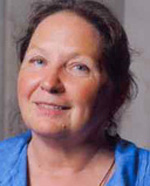 BARBARA R. DUNCAN, Ph.D., works as Education Director at the Museum of the Cherokee Indian in Cherokee, N.C. Her books include the Cherokee Heritage Trails Guidebook (with co-author Brett Riggs) which received the Preserve America Presidential Award, and Living Stories of the Cherokee which received the Thomas Wolfe Literary Award and World Storytelling Award. She recently received the Brown Hudson Award from the North Carolina Folklore Society. She is the author of other books and publications, including a chapbook of poetry, Crossing Cowee Mountain (New Native Press, 2008). A singer and songwriter, many of her songs address environmental concerns. She has two grown children and lives on a tributary of the Tuckasegee River. BARBARA R. DUNCAN, Ph.D., works as Education Director at the Museum of the Cherokee Indian in Cherokee, N.C. Her books include the Cherokee Heritage Trails Guidebook (with co-author Brett Riggs) which received the Preserve America Presidential Award, and Living Stories of the Cherokee which received the Thomas Wolfe Literary Award and World Storytelling Award. She recently received the Brown Hudson Award from the North Carolina Folklore Society. She is the author of other books and publications, including a chapbook of poetry, Crossing Cowee Mountain (New Native Press, 2008). A singer and songwriter, many of her songs address environmental concerns. She has two grown children and lives on a tributary of the Tuckasegee River.
|
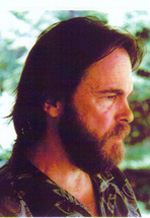 THOMAS RAIN CROWE is an internationally-published poet and essayist, the author of thirty books of original and translated works. He was a founding editor of Katuah Journal: A Bioregional Journal of the Southern Appalachians, which Gary Snyder called the best bioregional publication in the U.S. His memoir, Zoro’s Field: My Life in the Appalachian Woods (Univ. of Georgia Press, 2005), won the Southern Environmental Law Center’s prestigious Philip D. Reed Award for Outstanding Writing on the Southern Environment for 2006. The memoir, written in the style of Thoreau’s Walden, is based on four years (1979 to 1982) of self-sufficient living in a wilderness environment in the woods of western North Carolina. He has been a featured writer for such regional publications as Green Line, Wild Mountain Times, and the Mountain Xpress and currently writes about culture, community and the environment for the Smoky Mountain News. As an activist, since 1979 he has been involved with organizations such as The Canary Coalition (Clean Air), AMUSE (Artists and Musicians United for a Safe Environment), and Project to Protect Native American Sacred Sites in the southern Appalachians. He has served on the boards of the Southern Biodiversity Project, Western North Carolina Alliance, and the Environmental Leadership Council for western North Carolina. His most recent book of essays and articles is entitled The End of Eden: Writings of an Environmental Activist (Wind Publications, 2008). His literary archives have been purchased by the Duke University Special Collections Library. He lives in the mountain farming community of “Little Canada” along the Tuckasegee River in the Smoky Mountains of western North Carolina. THOMAS RAIN CROWE is an internationally-published poet and essayist, the author of thirty books of original and translated works. He was a founding editor of Katuah Journal: A Bioregional Journal of the Southern Appalachians, which Gary Snyder called the best bioregional publication in the U.S. His memoir, Zoro’s Field: My Life in the Appalachian Woods (Univ. of Georgia Press, 2005), won the Southern Environmental Law Center’s prestigious Philip D. Reed Award for Outstanding Writing on the Southern Environment for 2006. The memoir, written in the style of Thoreau’s Walden, is based on four years (1979 to 1982) of self-sufficient living in a wilderness environment in the woods of western North Carolina. He has been a featured writer for such regional publications as Green Line, Wild Mountain Times, and the Mountain Xpress and currently writes about culture, community and the environment for the Smoky Mountain News. As an activist, since 1979 he has been involved with organizations such as The Canary Coalition (Clean Air), AMUSE (Artists and Musicians United for a Safe Environment), and Project to Protect Native American Sacred Sites in the southern Appalachians. He has served on the boards of the Southern Biodiversity Project, Western North Carolina Alliance, and the Environmental Leadership Council for western North Carolina. His most recent book of essays and articles is entitled The End of Eden: Writings of an Environmental Activist (Wind Publications, 2008). His literary archives have been purchased by the Duke University Special Collections Library. He lives in the mountain farming community of “Little Canada” along the Tuckasegee River in the Smoky Mountains of western North Carolina.
|
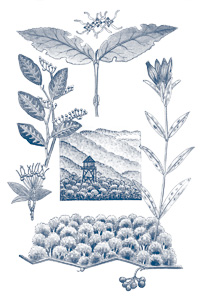
Left: Cover Illustration by Robert Johnson
ROBERT JOHNSON studied with Karl Knaths and Mark Rothko in the 1960s. He received his graduate degree in painting at Mills College (CA) before moving “back to the land” to the Celo community in the Smoky Mountains of western North Carolina as part of a 1,200 acre land trust and intentional community where he still resides. His work has been described as “a blend of pantheism and Deep Ecology” with its focus on the “recording of our vanishing, wide-open natural environment.” His work has been exhibited and collected widely in galleries and museums from Washington, D.C., to Georgia.
|
“A SUBLIMELY AWFUL SCENE …”
Here, in these poems, among these images and rhythms, pick your way through the tall purple-pink clusters of Joe Pye weed. Don’t mind the swallowtails fluttering about. Like you, they seek nature’s sweet nectar, a place, perhaps, where one may feel truly at home, a landscape one may slowly drink in, a timeless place where one, as Robert Frost put it, can “be whole again beyond confusion.”
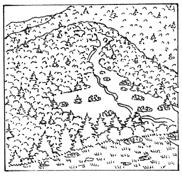 As you turn the pages of this chapbook you will find yourself surrounded by thickets of rhododendron, azalea, laurel, and blackberry (in fact, berries of all kinds — especially STRAWBERRIES in all their sweetness). Robert Johnson's fine sketches also put us in place. We stand on the heights, among the trees, in the fields with the rocks, acorns, and the veritable flowers and weeds: coneflowers, cardinal flowers, bindweed, downy goldenrod, and many more. There are bees in the “tiny white flowers” of the buckwheat, Little Brown Bats under the bridge railings, insects clattering on screens. Listen too for the “sound of grouse wings drumming in the woods,” the “lightning crack of a storm,” or the “murmur of song sparrows” seeping from the river. Ash, spruce, locust, and pine trees; old growth-new growth. As you turn the pages of this chapbook you will find yourself surrounded by thickets of rhododendron, azalea, laurel, and blackberry (in fact, berries of all kinds — especially STRAWBERRIES in all their sweetness). Robert Johnson's fine sketches also put us in place. We stand on the heights, among the trees, in the fields with the rocks, acorns, and the veritable flowers and weeds: coneflowers, cardinal flowers, bindweed, downy goldenrod, and many more. There are bees in the “tiny white flowers” of the buckwheat, Little Brown Bats under the bridge railings, insects clattering on screens. Listen too for the “sound of grouse wings drumming in the woods,” the “lightning crack of a storm,” or the “murmur of song sparrows” seeping from the river. Ash, spruce, locust, and pine trees; old growth-new growth.
*****
Words DO have their place; these poems focused on the awe-inspiring sublime of the Southern Appalachian mountains are shining proof.
Indeed, words in the service of landscape are the very foundation of Voices from the American Land. If, as the Cherokee language insists, no appropriate word for wilderness exists, that is not to say that words fail. It is to say that wilderness and civilization are interconnected to the point of being inseparable. “Nature,” as Gary Snyder says, “is not a place to visit, it is home.”
Or, as Barbara Duncan puts it:
we are all living
in the same world
and pray.
— from The Introduction by Anthony Hunt
An editor for Voices from the American Land, Anthony Hunt’s publications include his own poems and scholarship on various modern literary figures and movements, but the work of the contemporary American poet, Gary Snyder, was the major focus of his academic research for over 25 years, culminating in a book—Genesis, Structure, and Meaning in Gary Snyder's 'Mountains and Rivers Without End' (Univ. of Nevada Press, 2004).
Poem by Thomas Rain Crowe:
Bees in the Buckwheat
After the hurricane:
sky blue, wind blowing,
honey bees buzzing
atop the tiny white flowers.
Sugar Creek Gap — September, 2004
Excerpt from Brent Martin’s poem:
Fever in December
And before me there is the vast and static ocean
of the Nantahala and Unaka mountains,
where the great vulture once flew,
its giant wings flapping the muddy earth
into these rolling unbridled folds
from which Bartram retreated in awe.
Excerpt from Barbara Duncan’s poem:
Naming Place
People — still here.
Mountains — still here.
Words — still here.
If you want to know the truth:
unpave the roads and walk old trails;
root up parking lots and see villages;
live here a thousand years
until every breath sings mountains.
|
©All poetry and art shown
on this site is copyrighted by the authors and artists
and may not be copied or
reproduced in any way without express written permission. |
|

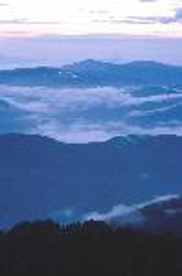
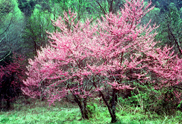
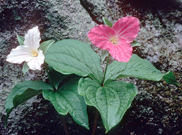
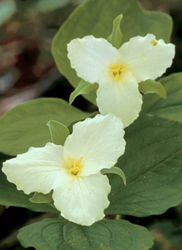
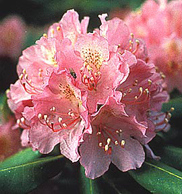
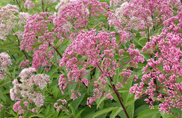
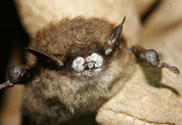
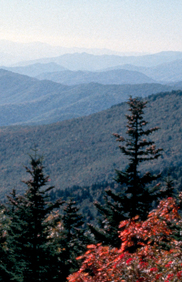
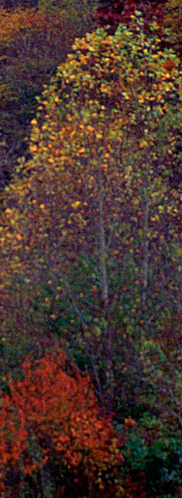
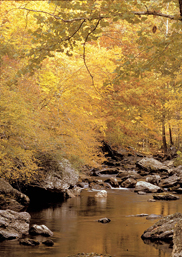
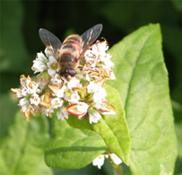
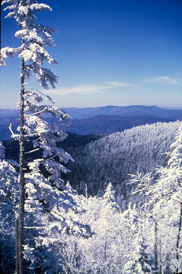
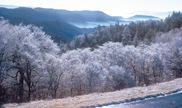
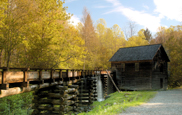
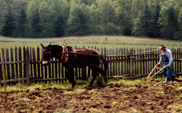
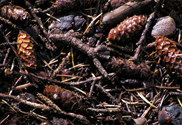








 BRENT MARTIN is the Southern Appalachian Director for The Wilderness Society, based in Sylva, NC. Prior to that he was the Associate Director for The Land Trust for the Little Tennessee and Executive Director of Georgia Forestwatch. He is a recipient of the Southern Environmental Law Center’s James S. Dockery Environmental Leadership Award, and holds a B.A. and M.A. in History from Georgia State University. He has published two collections of poetry, Poems from Snow Hill Road (New Native Press, 2007) and A Shout in the Woods (Flutter Press, 2010). His essay, “The Dividing Spring,” was recently published in Wildbranch Anthology (University of Utah Press, 2010), and other essays and poems have appeared in Pisgah Review, Tar River Poetry, Chattahoochee Review, New Southerner, Tiger’s Eye, North Carolina Literary Review, and elsewhere. He lives in the Cowee community of western North Carolina.
BRENT MARTIN is the Southern Appalachian Director for The Wilderness Society, based in Sylva, NC. Prior to that he was the Associate Director for The Land Trust for the Little Tennessee and Executive Director of Georgia Forestwatch. He is a recipient of the Southern Environmental Law Center’s James S. Dockery Environmental Leadership Award, and holds a B.A. and M.A. in History from Georgia State University. He has published two collections of poetry, Poems from Snow Hill Road (New Native Press, 2007) and A Shout in the Woods (Flutter Press, 2010). His essay, “The Dividing Spring,” was recently published in Wildbranch Anthology (University of Utah Press, 2010), and other essays and poems have appeared in Pisgah Review, Tar River Poetry, Chattahoochee Review, New Southerner, Tiger’s Eye, North Carolina Literary Review, and elsewhere. He lives in the Cowee community of western North Carolina. BARBARA R. DUNCAN, Ph.D., works as Education Director at the Museum of the Cherokee Indian in Cherokee, N.C. Her books include the Cherokee Heritage Trails Guidebook (with co-author Brett Riggs) which received the Preserve America Presidential Award, and Living Stories of the Cherokee which received the Thomas Wolfe Literary Award and World Storytelling Award. She recently received the Brown Hudson Award from the North Carolina Folklore Society. She is the author of other books and publications, including a chapbook of poetry, Crossing Cowee Mountain (New Native Press, 2008). A singer and songwriter, many of her songs address environmental concerns. She has two grown children and lives on a tributary of the Tuckasegee River.
BARBARA R. DUNCAN, Ph.D., works as Education Director at the Museum of the Cherokee Indian in Cherokee, N.C. Her books include the Cherokee Heritage Trails Guidebook (with co-author Brett Riggs) which received the Preserve America Presidential Award, and Living Stories of the Cherokee which received the Thomas Wolfe Literary Award and World Storytelling Award. She recently received the Brown Hudson Award from the North Carolina Folklore Society. She is the author of other books and publications, including a chapbook of poetry, Crossing Cowee Mountain (New Native Press, 2008). A singer and songwriter, many of her songs address environmental concerns. She has two grown children and lives on a tributary of the Tuckasegee River.  THOMAS RAIN CROWE is an internationally-published poet and essayist, the author of thirty books of original and translated works. He was a founding editor of Katuah Journal: A Bioregional Journal of the Southern Appalachians, which Gary Snyder called the best bioregional publication in the U.S. His memoir, Zoro’s Field: My Life in the Appalachian Woods (Univ. of Georgia Press, 2005), won the Southern Environmental Law Center’s prestigious Philip D. Reed Award for Outstanding Writing on the Southern Environment for 2006. The memoir, written in the style of Thoreau’s Walden, is based on four years (1979 to 1982) of self-sufficient living in a wilderness environment in the woods of western North Carolina. He has been a featured writer for such regional publications as Green Line, Wild Mountain Times, and the Mountain Xpress and currently writes about culture, community and the environment for the Smoky Mountain News. As an activist, since 1979 he has been involved with organizations such as The Canary Coalition (Clean Air), AMUSE (Artists and Musicians United for a Safe Environment), and Project to Protect Native American Sacred Sites in the southern Appalachians. He has served on the boards of the Southern Biodiversity Project, Western North Carolina Alliance, and the Environmental Leadership Council for western North Carolina. His most recent book of essays and articles is entitled The End of Eden: Writings of an Environmental Activist (Wind Publications, 2008). His literary archives have been purchased by the Duke University Special Collections Library. He lives in the mountain farming community of “Little Canada” along the Tuckasegee River in the Smoky Mountains of western North Carolina.
THOMAS RAIN CROWE is an internationally-published poet and essayist, the author of thirty books of original and translated works. He was a founding editor of Katuah Journal: A Bioregional Journal of the Southern Appalachians, which Gary Snyder called the best bioregional publication in the U.S. His memoir, Zoro’s Field: My Life in the Appalachian Woods (Univ. of Georgia Press, 2005), won the Southern Environmental Law Center’s prestigious Philip D. Reed Award for Outstanding Writing on the Southern Environment for 2006. The memoir, written in the style of Thoreau’s Walden, is based on four years (1979 to 1982) of self-sufficient living in a wilderness environment in the woods of western North Carolina. He has been a featured writer for such regional publications as Green Line, Wild Mountain Times, and the Mountain Xpress and currently writes about culture, community and the environment for the Smoky Mountain News. As an activist, since 1979 he has been involved with organizations such as The Canary Coalition (Clean Air), AMUSE (Artists and Musicians United for a Safe Environment), and Project to Protect Native American Sacred Sites in the southern Appalachians. He has served on the boards of the Southern Biodiversity Project, Western North Carolina Alliance, and the Environmental Leadership Council for western North Carolina. His most recent book of essays and articles is entitled The End of Eden: Writings of an Environmental Activist (Wind Publications, 2008). His literary archives have been purchased by the Duke University Special Collections Library. He lives in the mountain farming community of “Little Canada” along the Tuckasegee River in the Smoky Mountains of western North Carolina. As you turn the pages of this chapbook you will find yourself surrounded by thickets of rhododendron, azalea, laurel, and blackberry (in fact, berries of all kinds — especially STRAWBERRIES in all their sweetness). Robert Johnson's fine sketches also put us in place. We stand on the heights, among the trees, in the fields with the rocks, acorns, and the veritable flowers and weeds: coneflowers, cardinal flowers, bindweed, downy goldenrod, and many more. There are bees in the “tiny white flowers” of the buckwheat, Little Brown Bats under the bridge railings, insects clattering on screens. Listen too for the “sound of grouse wings drumming in the woods,” the “lightning crack of a storm,” or the “murmur of song sparrows” seeping from the river. Ash, spruce, locust, and pine trees; old growth-new growth.
As you turn the pages of this chapbook you will find yourself surrounded by thickets of rhododendron, azalea, laurel, and blackberry (in fact, berries of all kinds — especially STRAWBERRIES in all their sweetness). Robert Johnson's fine sketches also put us in place. We stand on the heights, among the trees, in the fields with the rocks, acorns, and the veritable flowers and weeds: coneflowers, cardinal flowers, bindweed, downy goldenrod, and many more. There are bees in the “tiny white flowers” of the buckwheat, Little Brown Bats under the bridge railings, insects clattering on screens. Listen too for the “sound of grouse wings drumming in the woods,” the “lightning crack of a storm,” or the “murmur of song sparrows” seeping from the river. Ash, spruce, locust, and pine trees; old growth-new growth.